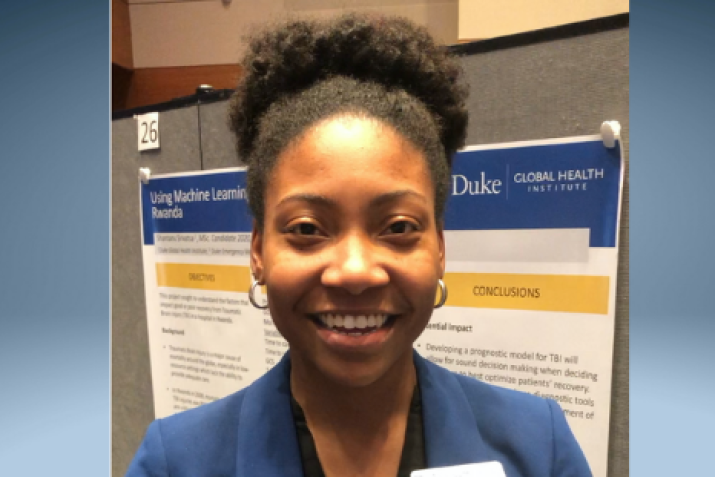
Taji Phillips graduated from DGHI's master of science in global health program in 2020.
Published October 16, 2020, last updated on October 22, 2020 under Research News
“It’s really the small things,” Taji Phillips BS’18 MS’20 explains, reflecting on a project she worked on in Kenya in 2019, between her first and second year as a graduate student at Duke Global Health Institute.
Having tea and mandazi, a popular breakfast pastry in Kenya, with the nurses at the hospital where she worked, and sharing stories and laughs with her research colleague helped Phillips create important bonds with her partners in Kenya.
“I was planning on arriving in Kenya and hitting the ground running [with work]. In reality, it was the exact opposite of that. I spent my first month in Kenya building my relationships with the people I worked with – my research assistant and the staff at the public hospitals. It’s a critical aspect in research and something I definitely underestimated,” Phillips says. “When I successfully built those personal relationships, it was very gratifying.”
Phillips’ research in Kenya focused on exclusive breastfeeding for six months — when a baby receives only breast milk, and no other liquids or foods. More specifically, fathers’ attitudes towards exclusive breastfeeding, and how they supported their partners through it.
Phillips was drawn to the opportunity on Nicholas Pearson’s team at Jacaranda Health in Nairobi, Kenya, because she had been interested in maternal and child health even before she came to the master’s degree program at Duke Global Health Institute.
“They were addressing maternal and child health in Kenya in practical, cost-effective, and innovative ways. At the time they were just starting their Walezi Pamoja project,” she adds, noting that the topic of exclusive breastfeeding was new to her.
A typical day at work
“My day would always start out at Jacaranda’s office, in Nairobi. I would check to make sure that I had enough copies of research instruments — consent forms, surveys, story completion prompts, interview guides — and my interview recorder with extra batteries,” says Phillips.
Then she and her research assistant, Antonia Mulinge, would check in with each other and catch an Uber to their study location, a public hospital in Kiambu county, Kenya about 14 miles away. After their arrival, they would check in with a nurse and a head doctor at the hospital and head to a private room where they’d conduct interviews with the fathers in their study.
After that, Taji says it was a “waiting game” to see if fathers were going to show up on time, or at all, to their scheduled interviews.
“If we were lucky, we’d have two or three fathers show up for data collection. If no one showed up, we would check the post-natal care ward to see if there were any eligible participants. In essence, every data collection scenario varied. After data collection, we’d clean up and thank the hospital staff,” she says.
The Uber ride back, from Kiambu to Nairobi, was often a 60- to 90-minute ride, but Phillips said it gave her and her assistant, Mulinge, a chance to get to know each other better.
“Honestly, she could make the Grinch smile,” Phillips says. And that kindness gave her a sense of community and confidence that she says she needed .
Early on, when she first began her research, Phillips says she felt a sense of “imposter syndrome” despite the fact that she had written her institutional review board protocol, designed her research instruments, organized all the logistics and taken all the right classes.
“I felt unqualified to conduct my research. When I was heading to my first round of data collection, I felt sick I was so nervous. That’s where I have to tip my hat to my research assistant. She was so wonderful, confident and personable… I learned a lot from her,” Phillips says.
Phillips’ advisors, Pearson and Kearsley Stewart, were not on the ground with her in Kenya, but she says both were close at hand virtually and they had regular video or phone chats. And she adds, “I was surrounded by support in the Jacaranda Health office. My on-site supervisor, Rachel Jones, was consistently checking in and helping me in whatever way I needed.”
Take-home findings
The participants in her study — fathers already engaged in maternal and child healthcare — demonstrated positive attitudes when it came to supporting exclusive breastfeeding, but Phillips said her findings indicate that they had limited basic knowledge about exclusive breastfeeding for six months.
“They struggled to recognize common breastfeeding challenges and the benefits of exclusive breastfeeding to the mother,” she says, noting though that they expressed an interest in receiving more information about breastfeeding.
While her study only speaks to the needs of a distinct group of men from the rural area where she collected data,and doesn’t represent the standard father in Kenya, it showed that there’s an opportunity to provide men there with information on the benefits of exclusive breastfeeding, common breastfeeding challenges, and technical ways to address those challenges.
What’s ahead?
Though Phillips’ experience with Jacaranda Health turned out a bit different than she expected, she says working there changed the way she views addressing maternal and child health issues.
“It’s definitely made me think deeper about the kind of work that can be done in a similar fashion here in the US,” she says.
This fall, she began working as a consulting analyst at Accenture, a global company driving technological innovation, and she hopes to work in health and public services to gain more exposure and see how technology is transforming this industry.
“I think it’s a great opportunity to learn and refine my skills, so I can leverage them against the issues I’m passionate about,” says Phillips.


